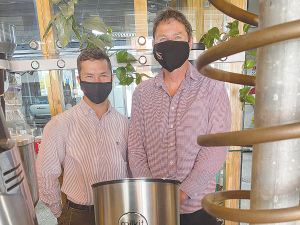Battle for milk
OPINION: Fonterra may be on the verge of selling its consumer business in New Zealand, but the co-operative is not keen on giving any ground to its competitors in the country.
 Josh Williams, Fonterra Brands NZ business development manager (left) and Eric Heycoop, Emporio Coffee Owner.
Josh Williams, Fonterra Brands NZ business development manager (left) and Eric Heycoop, Emporio Coffee Owner.
Fonterra is turning on milk taps in cafes, all in the name of sustainability.
Fonterra Brands New Zealand (FBNZ) is kicking off a trial which will see baristas making the same great coffee, but with a more sustainable pour, using 'Anchor café milk taps'.
The Anchor café milk tap is connected to a recyclable 10 litre bladder, filled with milk, which replaces five 2-litre standard milk bottles and results in 65% less plastic.
The co-operative says this is another step in Anchor taking a leadership position around sustainability and follows on from the launch of Anchor's plant-based bottle and the specialised range of 'carbon zero' milks.
FBNZ director for marketing, Mike Boness, believes cafés and coffee shops will also benefit because the milk tap measures the precise amount of milk into coffee cups, which means less waste and ultimately reduces their costs.
Anchor will be trialling 10 milk taps across the country and taking feedback from customers.
The first trial café is Emporio Coffee located in Wellington and owner Eric Heycoop is excited.
Heycoop says more people want to know that their food and drink is being served more sustainably.
"Because there is less waste and spillage with every pour from the taps, it means less cost for us and increased productivity and time savings for the baristas making coffee," he says.
"From our perspective it also enhances the whole café experience because it gives us more time to connect with our customers."
Boness says a team from Fonterra research centre in Palmerston North has conducted an evaluation of the available tap systems.
"The MilkIt system (supplied out of Israel was recommended as the best fit for Anchor proceeding to trial in cafés," he adds.
The World Wide Sires National All Day Breeds Best Youth Camp Best All Rounder plaudit has become family affair, with 2026 Paramount Cup winner Holly Williams following in her sister Zara's footsteps.
DairyNZ is giving New Zealand farmers a unique opportunity to gain hands-on governance and leadership experience within the dairy sector.
Herd improvement company LIC has posted a 5.2% lift in half-year revenue, thanks to increasing demand for genetics.
According to the latest Fresh Produce Trend Report from United Fresh, 2026 will be a year where fruit and vegetables are shaped by cost pressures, rapid digital adoption, and a renewed focus on wellbeing at home.
The Roar is a highlight of the game hunting calendar in New Zealand, with thousands of hunters set to head for the hills to hunt male stags during March and April.
OPINION: The past few weeks have been tough on farms across the North Island: floods and storms have caused damage and disruption to families and businesses.
OPINION: Fonterra may be on the verge of selling its consumer business in New Zealand, but the co-operative is not…
OPINION: What does the birth rate in China have to do with stock trading? Just ask a2 Milk Company.